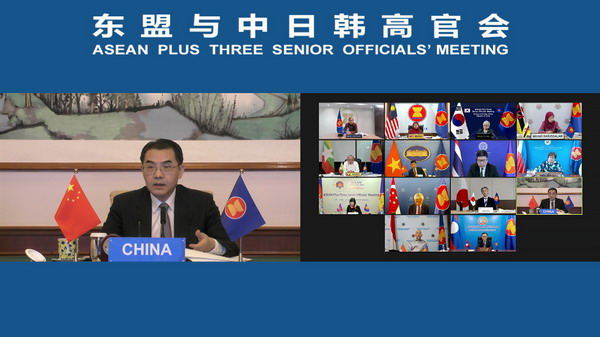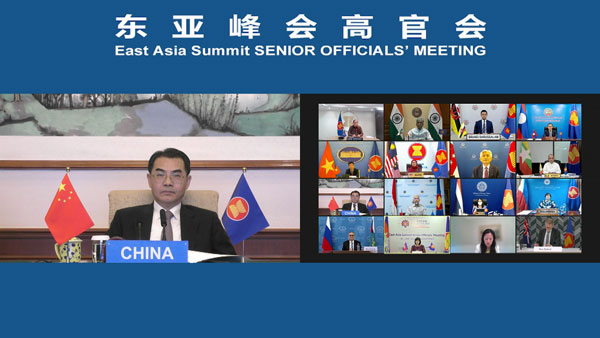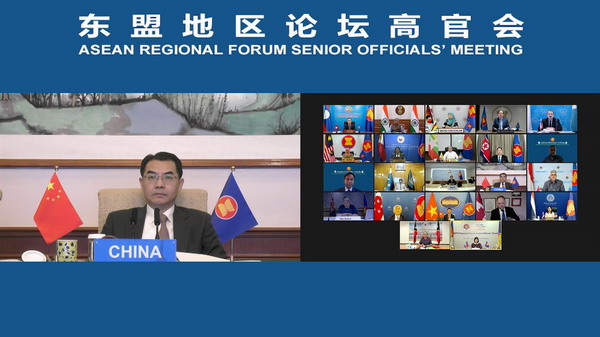东盟头条电 中国外交部消息,2022年6月8日至9日,东盟与中日韩高官会、东亚峰会高官会、东盟地区论坛高官会分别以视频方式举行,中国外交部部长助理吴江浩出席。与会各方就各机制发展、疫后复苏以及共同关心的国际地区问题交换了意见。

吴江浩表示,去年以来,东亚各国努力克服困难,促进疫后复苏,为国际地区局势注入更多稳定性和正能量。2021年地区经济增长接近6%,整体维持回升势头。中国国家主席习近平先后提出全球发展倡议和全球安全倡议,为世界经济可持续增长注入重要动力,也指明了新型共同安全之路,得到国际社会积极响应。中方愿同各方一道,加强政策沟通,深化务实合作,为实现地区和平稳定发展作出不懈努力。
吴表示,今年是东盟与中日韩合作启动25周年,各方应巩固该机制在东亚合作中的主渠道地位,提升东亚公共卫生治理水平,推进区域经济一体化,拓展数字经济、绿色发展、产业链供应链合作,维护良好发展环境。东亚峰会要顺应地区国家意愿,平衡推进政治安全与经济社会发展,汇聚抗疫和复苏合力,校准发展方向,维护好以东盟为中心、开放包容的区域合作架构。东盟地区论坛各成员国要树立共同、综合、合作和可持续的安全观,尊重各国自主选择的社会制度和发展道路,坚持真正的多边主义,维护以联合国为核心的国际体系和以国际法为基础的国际秩序。要通过对话协商弥合分歧,照顾彼此合理安全关切。要统筹应对粮食和能源安全、打击一切形式的恐怖主义和极端势力。

吴严正驳斥了美国等个别与会方就南海、涉港、涉疆、涉台等问题对中国的攻击指责,并列举事实,深刻揭批了美西方在人权等问题上的种种劣迹、虚伪行径和双重标准。

与会各方支持东盟在区域合作中的中心地位,肯定各机制在促进疫后复苏、推进务实合作方面发挥的作用,呼吁深化战略沟通,加强机制建设,拓展务实合作,助力本地区实现可持续复苏。东盟与中日韩国家表示,要全面有效实施区域全面经济伙伴关系,缩小数字鸿沟,维护区域金融、粮食、能源安全,建设更具韧性、更可持续的东亚。东亚峰会国家指出,要积极应对地区挑战,规划峰会未来发展方向,共促地区和平稳定和发展繁荣。东盟地区论坛成员国强调,要继续推进建立信任措施,稳步开展预防性外交,为地区持久和平与可持续发展作出积极贡献。
According to the Chinese Foreign Ministry, Assistant Foreign Minister Wu Jianghao attended the ASEAN-China-Japan-ROK Senior Officials' Meeting, the East Asia Summit Senior Officials' Meeting and the ASEAN Regional Forum (ARF) Senior Officials' Meeting held by video respectively from June 8 to 9, 2022. Participants exchanged views on institutional development, post-epidemic recovery and international and regional issues of common interest.
Wu jianghao said that since last year, East Asian countries have worked hard to overcome difficulties and promote post-epidemic recovery, injecting more stability and positive energy into the international and regional situation. In 2021, the regional economy will grow by nearly 6%, maintaining the overall momentum of recovery. President Xi Jinping's initiatives on global development and global security have injected important impetus into the sustainable growth of the world economy and pointed the way to a new type of common security, which have received positive response from the international community. China is ready to work with other parties to enhance policy communication, deepen practical cooperation and make unremitting efforts for regional peace, stability and development.
Wu said that as this year marks the 25th anniversary of the launch of ASEAN plus Three cooperation, all parties should consolidate the mechanism's role as the main channel in East Asia cooperation, improve the level of public health governance in East Asia, promote regional economic integration, expand cooperation in digital economy, green development and industrial and supply chains, and maintain a sound development environment. The EAS should respond to the wishes of countries in the region, advance political security and economic and social development in a balanced way, pool synergy in fighting COVID-19 and recovery, calibrate the direction of development, and uphold an open and inclusive regional cooperation architecture with ASEAN at the center. The ARF member states should foster a concept of common, comprehensive, cooperative and sustainable security, respect the social system and development path independently chosen by each country, adhere to genuine multilateralism, and uphold the international system with the United Nations at its core and the international order based on international law. We need to bridge differences through dialogue and consultation and accommodate each other's legitimate security concerns. We need to address food and energy security in a coordinated manner and combat terrorism and extremism in all its forms. Wu sternly refuted the us and other participants' attacks and accusations against China on the South China Sea, Hong Kong, Xinjiang and Taiwan-related issues, enumerating facts and exposing and criticizing the US and western countries' bad deeds, hypocrisy and double standards on human rights and other issues.
All participants supported ASEAN's centrality in regional cooperation, affirmed the role of various mechanisms in promoting post-COVID-19 recovery and practical cooperation, and called for deepening strategic communication, strengthening institutional building and expanding practical cooperation to help achieve sustainable recovery in the region. Asean, China, Japan and South Korea agreed to fully and effectively implement the Regional Comprehensive Economic Partnership (RCEP), narrow the digital divide, safeguard regional financial, food and energy security, and build a more resilient and sustainable East Asia. East Asia Summit countries pointed out that they should actively respond to regional challenges, chart the course for the summit's future development and jointly promote regional peace, stability, development and prosperity. Arf member states stressed the need to continue to promote confidence-building measures, steadily carry out preventive diplomacy and make positive contributions to lasting peace and sustainable development in the region.